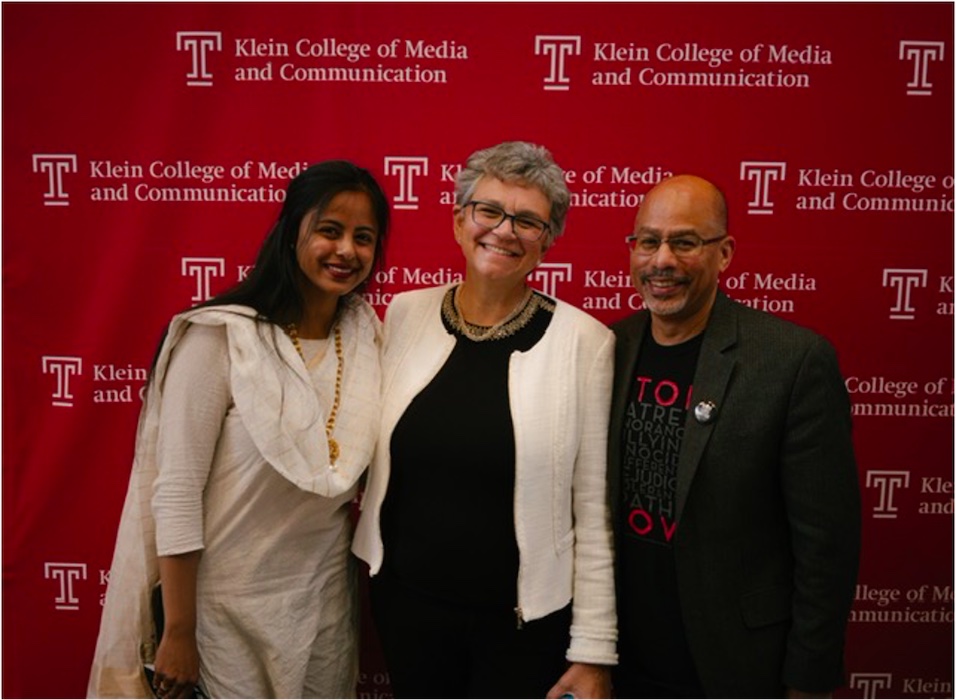Team teaching has not yet been pioneered at many universities. However, here at Klein College of Media and Communication, having multiple professors in one room has proven to be beneficial to both the professors and the students.
In January of 2022, many students had the opportunity to witness the magic of team teaching firsthand through the Klein Global Opportunities program Rocking the World: Disrupting Stereotypical Notions of Race, Class, and Religion. The course was created and taught by three professors in the Department of Advertising and Public Relations: Dana Saewitz, David Brown and Meghnaa Tallapragada. Through this course, these three professors learned the ups and downs of team teaching and gained the necessary tools to make it work. Of her colleagues, Dana Saewitz notes “we have great trust and mutual respect, and we couldn’t have done this if we didn’t have that foundational relationship which was the basis of everything”.
The course analyzed three major systems of oppression that have operated and continued to operate across the world: the history of slavery and racism in the United States, the history of the caste system in India and the Holocaust and Nazi Germany during World War ll. Since each of the professors brought their own specialized expertise and personal experiences to the course, the team teaching seemed effortless from the students' point of view. In order to bring cohesion to the classes, all three professors decided to introduce their topics through the same lenses which were “The Four E’s of Disruption: Education, Engagement, Empathy, and Empowerment”. These four E’s were a good starting point to look at how we can disrupt a caste system and many people used them in their final projects.
Despite their previous knowledge on these topics, the students were not the only one’s learning. Saewitz noted that “we attended each other’s sessions […] Meghana taught for one day about the Indian caste system, David taught for one day about racism and slavery and empowerment in the United States, and I taught for one day about the Holocaust, so we learned so much from each other. Each of us played the role of teacher and student.”
Looking at it from this perspective showed the students that were learning along with their professors and that created a very strong bond between the whole class. Tallapragada later went on to say, “I never anticipated the amount of support you have when you do team teaching that allows you to really engage with the students on a level that I don’t think I could have done if it was taught by one person.”
The freedom allowed by the professors was proven to be very beneficial to the students. As said by Meghnaa Tallapragada, “I think sometimes a rubric can be helpful, but sometimes a rubric can be restrictive. So, what worked for us was that the students submitted their work and then they would get feedback”. Having three different professors to get feedback and critiques from was another benefit of the team-teaching set-up.
The team teaching was so successful that the professors are carrying it on into this next year. “Even now, we are in the midst of accepting students for next January and we divided up the review of the applications, so we are very fair and generous with each other about taking on a workload,” Saewitz said.
Team teaching starts long before the students enter the classroom and continues long after the fact. It takes a considerable amount of planning to make sure the students are receiving this information in the best possible way. Right from the start at the pre-departure orientation in December, the professors all took the time to get to know the students and they plan to bring this practice into this year’s trip.
Both Brown and Tallapragada explained how this rapport building was a key component in getting ready for the class. Tallapragada said, “that was really helpful because we could all see each other and then it also allowed us to share a syllabus and ask questions.”
Brown added, “We were able to give them these nice notebooks because we encouraged them to journal while reading the book Caste: The Origins of Our Discontents.” It was the first-time team teaching for all three of them, and it is evident that they took a tremendous amount of time and effort to present the information in a way that the students would understand.

